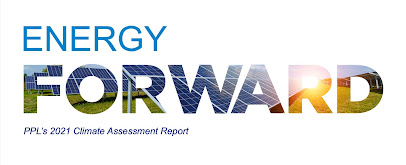Since PPL's last climate assessment report in 2017, the company has taken a number of steps to advance its emissions reductions and overall clean energy transition strategy.
This has included retiring aging fossil plants, advancing the planned retirements of others, reimagining the energy grid through innovation and making investments in clean energy technology research and development.
PPL has set a clear goal to achieve net-zero carbon emissions by 2050, with interim reduction targets of 80 percent from 2010 levels by 2040 and 70 percent by 2035.
To help achieve these reductions and support our net-zero goal, PPL has developed a clean energy strategy aimed at decarbonizing our owned generation and operations, bringing smart grid technology and renewable energy solutions to our customers, and investing in research and development necessary to support the deployment of affordable and reliable clean energy technologies.
"The transition to a clean energy future offers us an opportunity to rethink how energy is produced, stored, delivered and used. In the process, it offers opportunities for us to further reduce our environmental impact, invest in new infrastructure, empower customers with new options, and drive innovation that benefits society," said Vincent Sorgi, PPL president and chief executive officer. "Our 2021 Climate Assessment Report highlights the risks and opportunities associated with climate change and outlines our strategy to enable a responsible transition that balances our commitments to the environment, our customers, our employees and our communities."
PPL's Climate Assessment Report follows the Task Force for the Climate-Related Financial Disclosure framework, which informs the company's approach to supporting a clean energy transition and communicating with stakeholders in a transparent and consistent manner.
With emissions from owned generation resources representing the largest component of PPL's carbon emissions footprint and its corporate-wide carbon reduction goal, the company examined several climate scenarios, including mitigation pathways consistent with limiting global temperatures to an increase of 1.5° Celsius over pre-industrial levels and aligned with the United States' commitments to the Paris Agreement.
Through this analysis, and informed by assumptions and analysis included in the company's PPL 2021 Integrated Resources Plans in Kentucky, PPL projects that it is on a path to achieve its interim targets and outlines the technological advancements, partnerships and investments that are necessary to reach net-zero emissions by 2050.
The report also provides detailed analysis of the physical risks to our operations associated with climate change and how PPL's operating companies are mitigating those risks.
PPL's planning and resource allocations processes focus on strengthening grid resilience to reduce damage and speed recovery from severe weather impacts that could result from climate change.
Click Here for a copy of the report.
To learn more about the company’s net-zero initiatives, visit PPL’s Sustainability webpage.
[Posted: November 30, 2021] PA Environment Digest

No comments:
Post a Comment